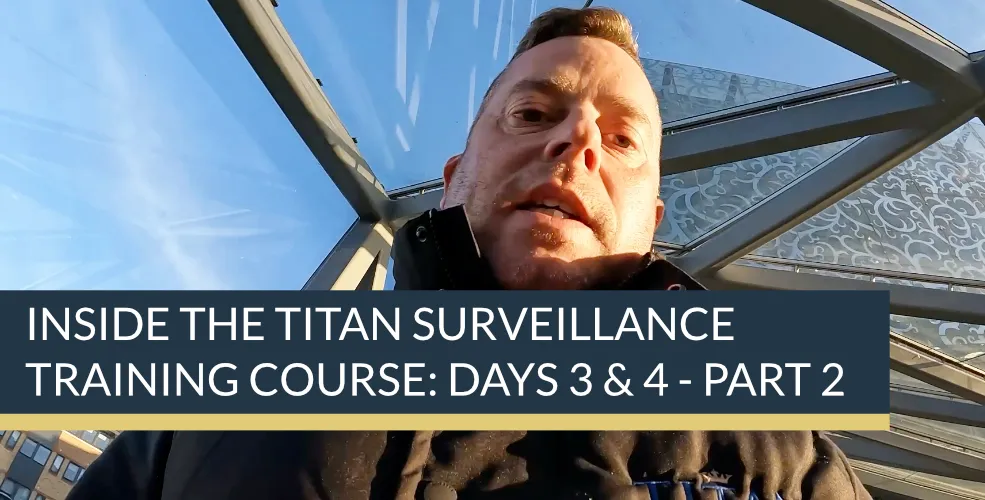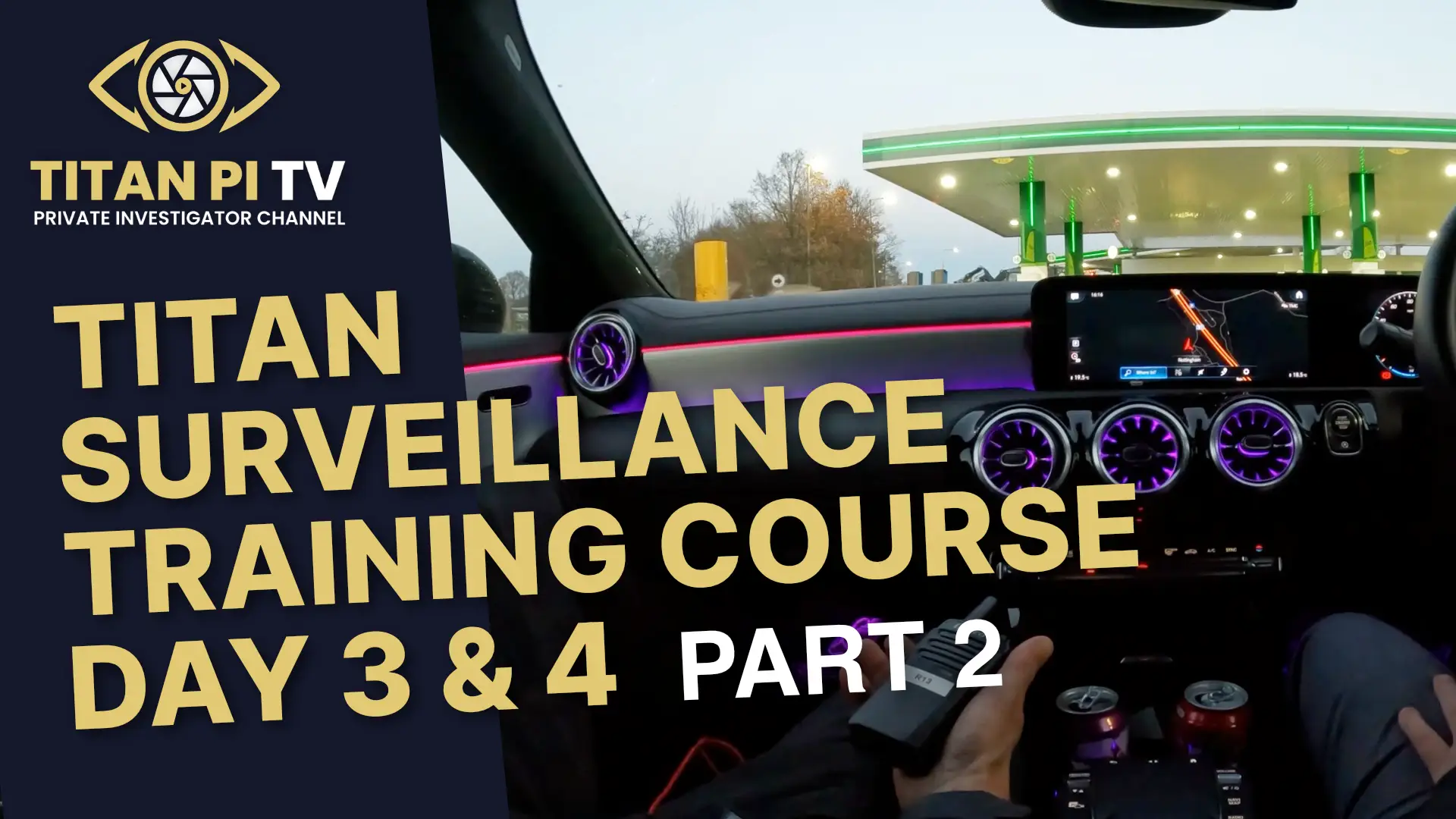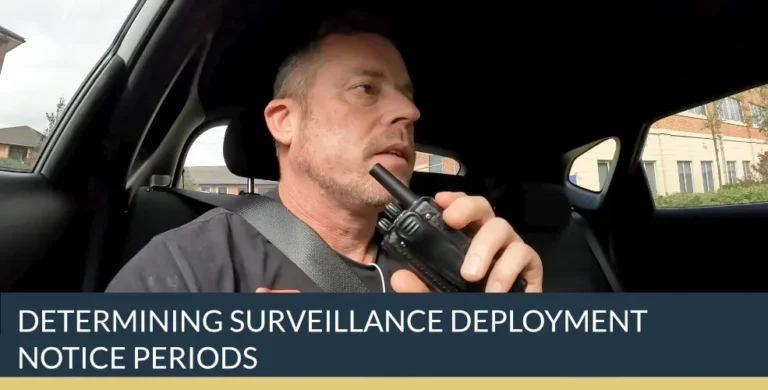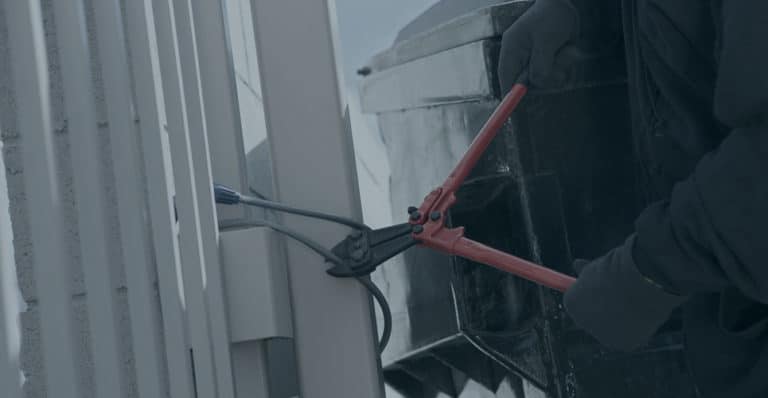Inside the Titan Surveillance Training Course: Days 3 & 4 – Part 2
Tailing Subjects: A Day in the Life of a Surveillance Training Team
Surveillance work is a meticulous blend of strategy, patience, and adaptability. Picture the scene: operatives subtly shadowing a subject through bustling urban landscapes, navigating through crowds, and transitioning seamlessly to quiet rural roads. Each move is calculated, each decision critical. For a surveillance team, the day is packed with challenges that require sharp instincts, advanced techniques, and seamless communication. Here’s an in-depth look into a day in the life of a professional surveillance training team, highlighting their methods, the obstacles they encounter, and the strategies that ensure success.
Tracking the Subject from Derby to Leicester
Initial Subject Acquisition and Off-Road Surveillance Techniques
The day begins early in Derby, where the team initiates their surveillance operation. The subject’s vehicle is identified, and operatives strategically position themselves to maintain visual contact while minimising the risk of detection. This stage, known as subject acquisition, is critical to setting the tone for the rest of the operation.
Surveillance in an urban environment such as Derby is no simple feat. Roads are busy, pedestrian traffic is unpredictable, and alleyways can act as both cover and a potential obstacle. The team must employ a mix of off-road surveillance techniques and visual contact strategies to ensure they remain discreet while following the subject.
Challenges and Strategies
As the subject moves through Derby, the team encounters a series of challenges. Narrow streets and sudden turns can obscure visibility, while the ebb and flow of foot traffic requires operatives to be constantly alert. To counteract these issues, operatives work in pairs or small groups, maintaining strategic positions around the subject.
- Discreet Proximity: Staying close enough to monitor the subject without drawing attention.
- Dynamic Positioning: Adjusting positions in real time to anticipate the subject’s movements.
- Communication Protocols: Clear, coded communication ensures that all team members are aware of changes in the subject’s behaviour or direction.
Surveillance at Leicester’s Highcross Shopping Centre
Pre-Planned Procedures
By the time the subject arrives at the Highcross Shopping Centre in Leicester, the team has already implemented a series of pre-planned procedures. Shopping centres are notoriously complex surveillance environments due to their sprawling layouts, high foot traffic, and security cameras. Each operative is assigned a specific role, ensuring that the subject is monitored from multiple angles without appearing suspicious.
Department Store Tactics
When the subject enters a large department store like John Lewis, the surveillance team adjusts their strategy. They split into smaller groups, with some operatives maintaining close proximity to the subject while others take up positions on alternate floors or at key exit points.
This approach allows the team to cover a wide area without losing sight of the subject. Their ability to blend into the crowd, whether by pretending to shop or casually browsing, is key to maintaining discretion.
Maintaining Visual Contact
The layout of the shopping centre offers both opportunities and risks. While the numerous vantage points can aid surveillance, they also present the danger of losing the subject in crowded areas. The team’s use of strategic placement ensures that someone always has eyes on the subject. Information is relayed via discreet earpieces or text messages, allowing operatives to adjust their positions quickly if the subject moves unexpectedly.
Motorway Surveillance and Strategic Exits
The Unique Challenges of Motorway Surveillance
After leaving Lutterworth, the operation transitions to the motorway—a completely different surveillance environment. Here, the challenges shift to high-speed travel, long distances, and unpredictable exits.
Motorway surveillance requires operatives to anticipate the subject’s next move while maintaining safe driving practices. A lead vehicle stays close to the subject, while secondary vehicles follow at a distance, ready to take over if needed.
Natural vs. Unnatural Exits
One key skill in motorway surveillance is recognising the difference between natural exits and unnatural exits. A natural exit aligns with the subject’s expected route or destination, whereas an unnatural exit may indicate a deviation designed to evade surveillance. Operatives are trained to spot these patterns and respond accordingly, ensuring the subject remains under observation.
Technical Support and Contingency Plans
Modern technology plays a crucial role in managing these challenges. GPS trackers placed on the subject’s vehicle provide real-time updates, allowing the team to maintain awareness even when visual contact is temporarily lost. Contingency plans, such as secondary vehicles or foot operatives stationed at potential exits, ensure that the operation remains seamless despite unexpected changes.
The Final Exercise Preparation
Reviewing the Day’s Operations
As the day draws to a close, the team gathers for a debrief to review the day’s activities. These post-operation reviews are an essential part of the surveillance process. Team members discuss what went well, identify any areas for improvement, and refine their strategies for future operations.
For example, if a delay in communication caused a momentary loss of contact with the subject, the team might adjust their protocols to prevent similar issues in the future. This culture of continuous improvement is what sets professional surveillance teams apart.
Teamwork and Communication
Throughout the day, the importance of teamwork and communication is evident. Surveillance is not a solo endeavour; it relies on the seamless coordination of multiple operatives, each playing a distinct role. From the lead vehicle operative tracking the subject to the foot units stationed at critical locations, every team member’s contribution is vital.
- Coded Language: Operatives use pre-agreed phrases and signals to maintain discretion.
- Role Clarity: Each operative knows their responsibilities, preventing confusion in high-pressure situations.
- Trust and Collaboration: A successful operation depends on mutual trust and a shared commitment to the mission’s objectives.
Preparing for Future Scenarios
With the day’s lessons fresh in their minds, the team begins preparations for the final exercise—a complex operation designed to test their skills under challenging conditions. The confidence they’ve gained from successfully tailing the subject reinforces their readiness for whatever lies ahead.
Day 3 & 4 Surveillance Training Conclusion
The life of a surveillance team is a mix of discipline, strategy, and adaptability. From the bustling streets of Derby to the high-speed challenges of motorway surveillance, each moment demands precision and focus. The team’s ability to navigate complex environments, maintain visual contact, and adapt to unexpected changes showcases the expertise required in this profession.
Surveillance is more than just tailing a subject—it’s a meticulous process that combines advanced training, cutting-edge technology, and exceptional teamwork. For those intrigued by the world of private investigation, Titan PI offers unparalleled insights into this fascinating field. Stay tuned to the Titan Private Investigation YouTube channel and Titan PI TV podcast for more stories and expert advice from the world of surveillance. Your next adventure into the art of investigation awaits!
Interested in becoming a Surveillance Operative?
For further advice and information about becoming a Surveillance Operative and Titan’s 5-day surveillance training course, then please feel free to speak to one of our professional team at one of the offices nearest to you.
London Surveillance Operative Training – Call the Titan Investigations London Office 020 39046622
Birmingham Surveillance Operative Training – Call the Titan Investigations Birmingham Office 0121 7162442
Cambridge Surveillance Operative Training – Call the Titan Investigations Cambridge Office 01223 662022
Derby Surveillance Operative – Call the Titan Investigations Derby (Head Office) 01332 504256
Leeds Surveillance Operative Training – Call the Titan Investigations Leeds Office 0113 4574066
Leicester Surveillance Operative Training – Call the Titan Investigations Leicester Office 0116 2436520
Nottingham Surveillance Operative Training – Call the Titan Investigations Nottingham Office 0115 9646950
Manchester Surveillance Operative Training – Call the Titan Investigations Office 0161 3023008
Sheffield Surveillance Operative Training – Call the Titan Investigations Sheffield Office 0114 3499400
Truro Surveillance Operative Training – Call the Titan Investigations Truro Office 01872 888706
Alternatively, you can contact us directly using our fully confidential contact form at enquiries@titaninvestigations.co.uk or chat directly using our Live Chat facility and one of our surveillance training course team will get right back to you.





















